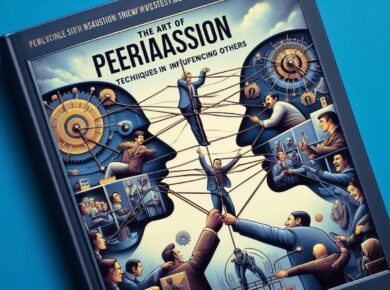Table of Contents
- Why Effective Communication Matters
- Key Communication Skills for Success
- Strategies for Improving Communication in Different Settings
- Overcoming Common Communication Barriers
- Tips for Building Confidence in Communication
- Mastering Written Communication Skills
- The Role of Emotional Intelligence in Communication
- The Impact of Technology on Communication Skills
- Conclusion
In both personal and professional settings, effective communication skills are essential for building connections, avoiding misunderstandings, and achieving goals. While many people assume that communication is a natural skill, truly effective communication takes practice, awareness, and the ability to adapt to various situations. This article explores key strategies for mastering communication skills to succeed in any interaction.
Why Effective Communication Matters
Good communication is the foundation of strong relationships, trust, and collaboration. Whether in a workplace or social setting, clear communication enables individuals to express their ideas and understand others’ perspectives, reducing conflicts and promoting teamwork.
Benefits of Strong Communication Skills
- Enhanced Relationships: Communication builds trust and understanding, leading to stronger bonds.
- Career Growth: In the workplace, clear communicators are often seen as leaders.
- Conflict Resolution: Skilled communicators can navigate disagreements smoothly, finding solutions without escalation.
Key Communication Skills for Success
1. Active Listening
One of the most critical skills in communication is listening. Active listening goes beyond just hearing words; it involves focusing on the speaker, understanding their message, and responding thoughtfully.
- Practice Mindfulness: Focus on the speaker without letting your mind wander.
- Non-Verbal Feedback: Use nods and expressions to show you’re engaged.
- Avoid Interrupting: Let the speaker finish before responding, ensuring you fully grasp their point.
2. Clarity and Conciseness
Being clear and concise helps avoid misunderstandings. Overloading a conversation with too much information or unclear language can confuse the listener.
- Use Simple Language: Avoid jargon or complicated words unless necessary.
- Stay on Topic: Keep the message focused and direct.
- Limit Filler Words: Words like “um” or “like” can distract and weaken your message.
3. Non-Verbal Communication
Body language, facial expressions, and eye contact all contribute to how your message is received. Mastering non-verbal cues can enhance the impact of your words.
- Maintain Eye Contact: This shows confidence and attentiveness.
- Watch Your Posture: Stand or sit upright to convey engagement.
- Use Gestures Mindfully: Appropriate gestures emphasize points but shouldn’t distract.
4. Empathy
Empathy involves understanding and acknowledging others’ feelings, which helps build rapport and trust. Being empathetic shows that you care about the other person’s perspective.
- Acknowledge Feelings: Reflect back emotions by saying things like, “It sounds like you’re feeling…”
- Show Understanding: Let the other person know you understand their point, even if you don’t agree.
- Practice Patience: Allow others to express themselves fully, even if they’re upset or stressed.
5. Open-Mindedness
Effective communicators keep an open mind, considering other viewpoints and being willing to adapt. Open-mindedness allows for productive dialogue and problem-solving.
- Avoid Assumptions: Don’t jump to conclusions about what someone means.
- Be Receptive to Feedback: Welcome feedback as a way to improve.
- Stay Flexible: Be willing to adjust your approach as the conversation evolves.
Strategies for Improving Communication in Different Settings
In the Workplace
Workplace communication can be challenging, especially when collaborating with diverse teams. Adopting specific strategies helps foster a positive and productive environment.
- Regular Check-Ins: Schedule team meetings to stay updated and address issues proactively.
- Use Technology Wisely: Leverage tools like Slack or email for clarity but avoid over-reliance, as face-to-face discussions can be more effective.
- Adapt Your Style: Different people respond to different communication styles, so try to understand your colleagues’ preferences.
With Friends and Family
Communication in personal relationships requires sensitivity, patience, and authenticity. Improving communication with loved ones strengthens bonds and prevents misunderstandings.
- Be Open and Honest: Share your thoughts and feelings openly, fostering transparency.
- Show Appreciation: Express gratitude and recognize others’ efforts and emotions.
- Set Boundaries: Respect each other’s space and time, ensuring that communication remains positive.
In Public Speaking
Public speaking requires confidence and clarity. The following strategies can help you deliver impactful messages to groups, large or small.
- Know Your Audience: Tailor your message to the interests and understanding level of your audience.
- Practice Regularly: Rehearse your speech multiple times to reduce nervousness.
- Engage the Audience: Ask questions or invite feedback to make the audience feel involved.
Overcoming Common Communication Barriers
Certain obstacles can hinder communication, but identifying and addressing these barriers can lead to clearer interactions.
1. Language Differences
When speaking with someone who has a different primary language, simplify your language, avoid slang, and consider using translation tools if necessary.
2. Emotional Barriers
Strong emotions, such as anger or frustration, can interfere with clear communication. Practice self-regulation to stay calm and focused on the message rather than the emotion.
3. Physical Distractions
External factors like noise or uncomfortable settings can disrupt communication. Find a quiet, comfortable environment to ensure both parties are fully present.
Tips for Building Confidence in Communication
Many people struggle with confidence, which affects their ability to communicate effectively. With practice and some techniques, you can boost your confidence and speak with clarity.
Practice Speaking in Low-Stakes Situations
Start practicing in casual conversations where the pressure is low. Small talk, daily interactions, and relaxed discussions are great for building confidence gradually.
Prepare and Rehearse
Whether it’s for a meeting, presentation, or difficult conversation, preparing and rehearsing can make a significant difference. Knowing your main points allows you to speak naturally and confidently.
Use Positive Self-Talk
Shift from negative thoughts to positive affirmations, such as “I am capable of handling this conversation well.” This self-encouragement can help calm nerves and increase confidence.
Mastering Written Communication Skills
With the rise of digital communication, writing is now an essential part of effective communication. Here are ways to strengthen your written communication:
- Organize Your Thoughts: Outline main points before starting to write.
- Use Proper Grammar and Spelling: Clear writing avoids confusion and shows professionalism.
- Be Concise: Stick to relevant information, as lengthy messages can lose impact.
The Role of Emotional Intelligence in Communication
Emotional intelligence (EI) involves recognizing and managing your emotions as well as understanding others’ feelings. High EI can improve communication by fostering empathy, patience, and adaptability.
- Self-Awareness: Recognize your own emotional triggers to prevent overreactions.
- Self-Regulation: Stay calm and composed, especially in high-stress situations.
- Social Skills: Use active listening and body language to show engagement.
The Impact of Technology on Communication Skills
Technology has transformed how we communicate, making it easier but sometimes less personal. Finding a balance between digital and face-to-face interactions is key.
Using Digital Tools Wisely
Tools like video calls, instant messaging, and emails are convenient, but it’s important to know when to switch to in-person or phone conversations, especially for sensitive topics.
Mindful Digital Etiquette
Be mindful of tone and timing in digital communication. Text messages, for example, can sometimes come across as abrupt or impersonal.
Conclusion
Effective communication skills are essential for success in today’s world, from personal relationships to professional settings. By mastering skills like active listening, empathy, and clarity, and adapting strategies for various situations, you can build strong connections and convey your ideas with impact. Remember, communication is a continuous journey of learning and improvement, and by embracing these key strategies, you’re well on your way to achieving success in every interaction.






